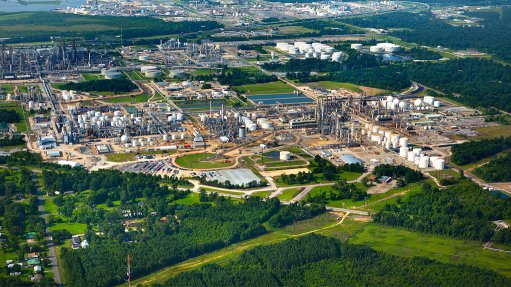
The Lake Charles chemicals project, in the US.
JSE- and NYSE-listed Sasol said on Tuesday it had resolved the issues with the acetylene removal system of the ethane cracker at the Lake Charles chemicals project (LCCP) in the US, and that ethylene production rates were on the rise.
The ethane cracker achieved beneficial operation in August, but had been running only at about 50% to 60% of nameplate capacity, owing to underperformance of the acetylene removal system.
With the acetylene reactor catalyst replaced, ethylene production rates were now about 85% to 90% of nameplate capacity and were increasing, at a quality that meets US Gulf Coast ethylene pipeline specifications, the integrated energy and chemicals company said.
Meanwhile, Sasol also stated that the LCCP low density polyethylene unit was being commissioned and that it would achieve beneficial operation this month.
The company further confirmed that the remaining three downstream units under construction to complete the integrated LCCP site – Ziegler Alcohols and Alumina, Alcohol Ethoxylates, and Guerbet Alcohols – remained on cost and schedule as per its previous guidance.
Sasol has had continued troubles at LCCP and has suffered major cost blowouts, which resulted in the company parting ways in October with its joint CEOs Bongani Nqwababa and Stephen Cornell. The LCCP could cost as much as $12.9-billion to complete, well above the initial price-tag of $8.9-billion.
The ethane cracker at Lake Charles is one of the largest in the world with a nameplate capacity of 1.54-million tons a year. About 90% of the cracker's ethylene output will be further processed into commodity and high-margin specialty chemicals for markets.